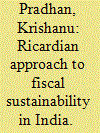| Srl | Item |
| 1 |
ID:
148507


|
|
|
|
|
| Summary/Abstract |
There are several approaches to assessing the sustainability of a country’s public finances. Ricardian equivalence is one such approach, in which fiscal sustainability is defined in terms of the neutrality of generational welfare through government fiscal policy. The present work is an attempt to discuss and analyse fiscal sustainability in India in the context of Ricardian equivalence. Different forms of empirically testable equations for testing Ricardian equivalence are derived based on studies by Buiter and Tobin (1978), Kormendi (1983) and Kormendi and Meguire (1990). A key aspect of fiscal sustainability is to ensure generational equity as reflected in India’s Fiscal Responsibility and Budget Management (FRBM) Act, 2003. Based on availability of data, empirical evidence is against the presence of Ricardian equivalence, indicating that the fiscal policy India pursued during the study period (1974–2011) has been detrimental to generational welfare neutrality.
|
|
|
|
|
|
|
|
|
|
|
|
|
|
|
|
| 2 |
ID:
174786


|
|
|
|
|
| Summary/Abstract |
This article provides an empirical approach to analyze the validity of the Ricardian equivalence (RE) theorem for China using time series data over the period 1990 to 2016. The results reveal that private consumption (c) has a long run relationship with tax (T), budget deficit (d), real interest rate (r), and government spending (G2). The empirical results exhibit that the coefficients of T, r, and d are negative and statistically significant which means that an increase in any of variable will reduce private consumption. The proposition of RE theorem holds that it is insignificant if budget deficit is financed by tax increase or debt issue, since under specific conditions, the impact of government consumption on total demand remains orthogonal to the method of financing budget deficit because rational economic agents consider todays deficit financing as tomorrows tax liabilities. The results of multicointegration estimation and rational expectations model invalidates the RE theorem in China. The rejection of the RE theorem for China is due to liquidity constraint, uncertainty which offsets consumption, and finite time horizons which invalidate the RE theorem.
|
|
|
|
|
|
|
|
|
|
|
|
|
|
|
|